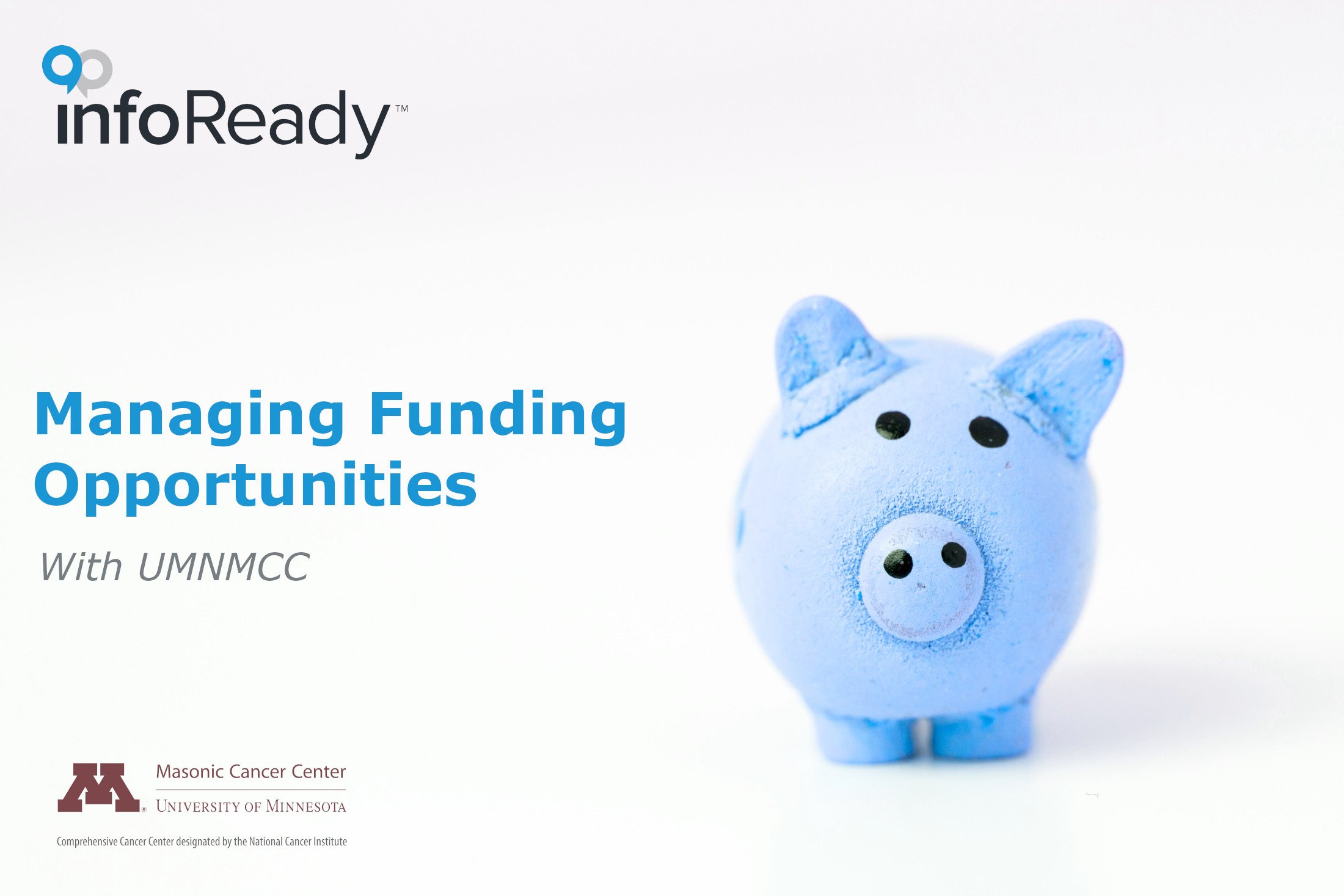In the ever-evolving landscape of cancer research, the need for efficient tools and platforms to support research initiatives has become increasingly crucial. InfoReady is one of these tools. InfoReady’s software platform is designed to streamline the collection, review, and approval processes for various research programs. Recently, during a webinar featuring Julie De Jäger, Deputy Associate Director for Administration at Case Comprehensive Cancer Center, affiliated with Case Western Reserve University and Katie Smolnycki, Director of Institutional Partnerships, Fred Hutch Cancer Center shared insights on how InfoReady has manage their research administration processes efficiently. Following are highlights of their conversation. For the full webinar, please visit Supporting Research in Cancer Centers on YouTube.
How are you using InfoReady?
Julie: “We started using InfoReady mainly for pilot grants. Our pilot grant program really expanded in the past few years. We were just doing everything by email, and we needed something. We discovered that Our CTSC, our Clinical and Translational Scientific Collaboration Group, was also looking for something. Together, we were looking at InfoReady so that the university could purchase the license as a whole. Initially, we all bought it to use for pilot awards, but we pretty quickly recognized that it could have some other useful capabilities.
We've been using it as well for limited submission competitions, and then more recently for our membership applications for the Cancer Center for about two years now.”
Katie: “At Fred Hutch, we started using InfoReady approximately 18 months ago to streamline our funding opportunities process. Previously, we relied heavily on email and an internal database on SharePoint. After merging with Seattle Cancer Care Alliance, we realized the need for a more efficient system and identified InfoReady as a solution. We now utilize it for both external funding opportunities and internal awards, including seed and pilot grants, commercialization grants, and industry-sponsored opportunities. We are also exploring its potential for limited applicant awards and submissions.”
What has been the before and after impact of InfoReady?
Katie: Previously, there were 10 different groups within the organization using various systems like Redcap, SharePoint, emails, Google, and Microsoft forms. InfoReady has helped streamline processes and ensure consistency in our processes and in the questions we ask. Before researchers didn’t know where to look for funding opportunities. Now with InfoReady, everything is centralized.
Before I used Microsoft Excel, then Forms for our reviewers. Then we piloted InfoReady for our internal commercialization fund, the Evergreen Fund, with external reviewers. I'm very excited. It worked very well for that. I think it's going to save us a lot of time.”
Julie: “One helpful thing is just the ability to share the workload a little bit better to assign co-administrators. Before we had a shared email address that reviewers and pilot grants were supposed to come to, but inevitably, things would go to individual people rather than to that shared email address.
Having things go through InfoReady means that the administrators can pick up the ball if someone goes on maternity leaves, for example. We don't need to worry about what's hiding in someone else's inbox. It’s been really helpful being able to go back and find the information when we need it.
We had a way of storing information in our shared Box drives, and we still use our shared Box drives extensively. But in the “before times” when our pilot grants administration was heavily resting on one individual, things would just get lost in that individual's inbox. So, being able to go back and have a historical record is really useful.
I think there's just more standardization of what the applicants are expecting to upload, or we've been able to be really clear about what we need from people. Our whole process has been a little bit more standardized, and that's really useful.”
How do you identify getting reviewers for opportunities that are open for everyone?
Katie: In terms of identifying the reviewers for our limited applicant awards, we have a committee of members of our consortium that review them. Our Evergreen fund is a commercialization-focused one. We actually work with external partners. We have reviewers from venture capital, biotech and pharma to get different perspectives on what different partners are looking for. Then for some of our consortium grants, we have a committee that they pull together based on what applications they're getting. It depends on the funding mechanism, but typically, if it's open to the consortium, we'll generally have members across the consortium there. Then for specific opportunities, we'll identify the most relevant committee members to help us make decisions.
Julie: For reviewers, we are similar to Katie, we have committees that are standing committees for different opportunities for different things. We have a slightly smaller one for our limited submissions, and then we have some bigger standing committees for our pilot grants. Then our scientific directors of the pilot grant programs review the applications and pick the reviewers from our standing committees depending on the content of the pilot applications. That remains a tricky process because just selecting those people and finding who's available and willing at the time. If you have a solution for that, then let us know.
About the standing research committees, how do you get people on them? How long is the commitment for? How do you engage with them?
Katie: I guess I can start. For our LAA committee, it is a bunch of our senior leaders, so SVPs of all of our divisions, EVPs, and then our advancement and promotions committee. That is just a sec group that our senior leadership decides. For our Evergreen fund, and I keep speaking about this because this is the one I manage, that one we typically- I'm going to be asking about I'll get one later.
Okay. For our Evergreen fund, it is an annual call for proposals, and we usually refresh that list once a year. We have some people that have been on since its inception about six, seven years ago. We did take a brief break in COVID, but it's once a year. There's a full committee meeting virtually, and then there are presentations in-person that everyone comes to Seattle. We had people come from London that were a venture capitalist that flew to Seattle on their own dime to actually engage with our researchers, which is amazing. For that, we look at our close partners and friends of in the VEC and biotech and pharma space and see who would be a good fit based on the applications we're expecting to get. It's a smaller commitment than our standing LAI committee.
Julie: I think some of our committees are a little different. We have a small group of folks from our senior leadership, five people who are consistently willing to review our limited submission opportunities. There's fewer of those, usually. It's less of a commitment, but it's maybe more of a commitment from the cancer center that we're putting forth this applicant. That's just involves a few of our senior leaders.
Then we have a couple of different groups that we pull from for pilot reviews. None of these standing committees... If you're on a standing committee, it doesn't mean that you always have to be available to accept without the possibility of reviewing. It means, ‘I might be available, but ask me first’. That's how our committees tend to work for our pilot reviews.
For our Junior Investigator Awards, we have an American Cancer Society institutional research grant. Every three years, when we renew that grant, we revise that list of committee members, and we make sure that that list includes some former awardees of the ACS IRG pilot awards. We also make sure that there's a good balance of basic and population and clinical researchers on that list. Then for all our other pilot awards, our scientific director of the pilot awards keeps his own informal list, again, of people who have expressed willingness to help out.
But then we always reach out to first and say, ‘Okay, we have a pilot award that might be in your area. Would you be willing to help?’ Then if we get a pilot award that doesn't match any of our current committee members, we have some scientific liaison admins who identify some people we might invite to review, and then if they're happy to keep doing that, just stay on that list. That's what we I think.
Conclusion
The adoption of InfoReady has not only optimized administrative workflows but also catalyzed collaborations and innovation in cancer research. By leveraging the platform's features for progress reporting, data collection, and application management, research institutions can drive impactful outcomes and measure the return on investment for funding initiatives. The integration of InfoReady into cancer centers' operations exemplifies a commitment to enhancing research capabilities and fostering a culture of excellence in the fight against cancer.
As cancer centers continue to navigate the complexities of research administration, embracing innovative tools like InfoReady can pave the way for transformative advancements in the field. By embracing technology that streamlines processes, enhances data management, and promotes collaboration, institutions can amplify their research impact and strengthen their position in the fight against cancer. The integration of InfoReady into cancer centers' operations can enhance the capabilities of a research administration teach to promote research at their organization.



